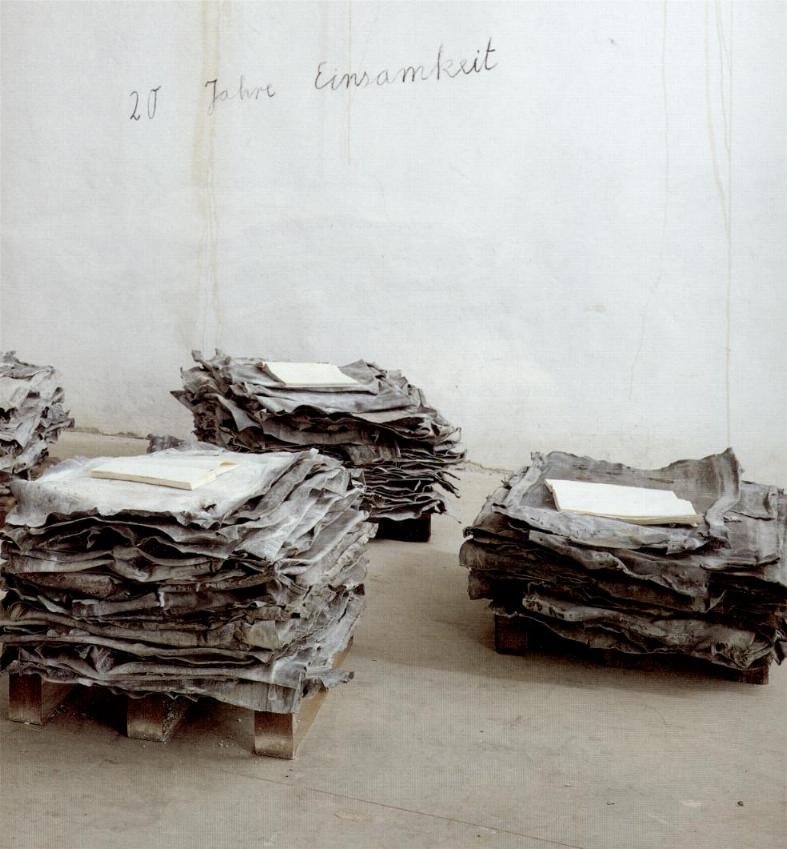Sunday, September 30, 2007
Friday, September 28, 2007
Bill and Flossie Williams' Refrigerator

This is Just to Say
I have eaten
the plums
that were in
the icebox
and which
you were probably
saving
Forgive me
they were delicious
so sweet
and so cold.
Reply
(crumped on her desk)
Dear Bill: I've made a
couple of sandwiches for you.
In the ice-box you'll find
blue-berries--a cup of grapefruit
a glass of cold coffee.
On the stove is the tea-pot
with enough tea leaves
for you to make tea if you
prefer--Just light the gas--
boil the water and put it in the tea
Plenty of bread in the bread-box
and butter and eggs--
I didn't know just what to
make for you. Several people
called up about office hours--
See you later. Love. Floss.
Please switch off the telephone.
Blogger Play
Watch it here.
Sin and Salvation in Advertising

"The Seven Deadly Sins, in other words, are problems to be solved through chemistry and technology. On commercials, there are no intimations of the conventional roads to spiritual redemption. But there is Original Sin, and it consists of our having been ignorant of a product that offers happiness. We may achieve a state of grace by attending to the good news about it, which will appear every six or seven minutes. It follows from this that he or she is most devout who knows of the largest array of products; they are heretics who willfully ignore what is there to be used." (125)
Thursday, September 27, 2007
Baraka recap

- He went off on Colin Powell and Condoleeza Rice while I was out. Nina summarized for me.
- "You're in college because some people love you and those people who love you, that's who you serve."
- He brought up the idea of having a sort of united black political party a lot.
- He referred to white people as "our enemies" throughout the talk.
- "skin is thin, class with kick your ass"
- a beautiful bit of a poem, something like: "was it ever so quiet that the room started asking you questions"
- Lauryn Hill and his son, Ras Baraka have collaborated on a couple songs.
- recommended this guy: Sekou Sundiata, The Blue Oneness of Dreams
- Nina's note: LOTS of anger/conspiracy theory
Well, I'm glad I went. The audience was about 1/3 white. There were about 150 people there. He ended the evening by reading his super-controversial poem "Somebody Blew Up America" (read it here) He introduced it by saying "Let me read this poem that got me thrown out of being a poet laureate of New Jersey." And, he said later, that they didn't technically throw him out, but actually removed the position. So, right now, New Jersey is the only state that doesn't have a poet laureate. Haha. Hearing him read the poem was amazing. There's a section where he asks "who? Who? WHO?" and he read it like I read a Dr. Seuss book. He was almost sing-songy in parts and shrieking in others.
What I'm Cooking, pt. 2: Noodles with Scallions, Shiitake Mushrooms, and Snow Peas

This is another recipe from Nigella Lawson's How To Eat, and it was awesome. A really simple dish - basically stir-fry with egg noodles. I love food, I love the way it feels, I love learning about it. I've been feeling really up and down with my emotions lately (besides an awesome, week-making conversation this morning) and cooking connects me with some woman-ness in me and calms me down. Now I know why my mom likes it so much, it just feels good.
Lets hope the pasta keeps for a couple days. My dishes always look like hell three days later.
Oh, and the food was just so beautiful when I was chopping up the ingredients. I had to use Oyster mushrooms instead of Shiitake because that's all they had at HyVee.

Wednesday, September 26, 2007
Amiri Baraka
 In honor of poet Amiri Baraka coming to Mizzou tonight (tickets were FREE!!), here are a couple of his poems. Baraka is a pretty angry black poet, and I am fully expecting to be yelled at tonight. Fortunately it's being held in Jesse Hall Auditorium, which is enormous (I saw Maya Angelou there last semester...it was amazing) and so he won't actually be able to see me cowering.
In honor of poet Amiri Baraka coming to Mizzou tonight (tickets were FREE!!), here are a couple of his poems. Baraka is a pretty angry black poet, and I am fully expecting to be yelled at tonight. Fortunately it's being held in Jesse Hall Auditorium, which is enormous (I saw Maya Angelou there last semester...it was amazing) and so he won't actually be able to see me cowering.Did you know...

The countries with no minimum drinking age:
- Armenia
- Azerbaijan
- China
- Fiji
- Nigeria
- Poland
- Portugal
- Georgia
- Thailand
- Vietnam
Also, interesting information about drinking laws in Missouri: the rumor is actually true, a minor can drink "when a family member consents and/or is present." (Helpful website on drinking laws).
Monday, September 24, 2007
Did You Know...
 "A more sinister example of bad things transported from the First World to developing countries is that the highest blood levels of toxic industrial chemicals and pesticides reported for any people in the world are for Eastern Greenland's and Siberia's Inuit people (Eskimos), who are also among the most remote from sites of chemical manufacture or heavy use. Their blood mercury levels are nevertheless in the range associated with acute mercury poisoning, while the levels of toxic PCBs (polychlorinated biophenyls) in Inuit mother's breast milk fall in a range high enough to classify the milk as "hazardous waste." Effects on the women's babies include hearing loss, altered brain development, and suppressed immune function, hence high rates of ear and respiratory infections...It's because staples of the Inuit diet are whales, seals, and seabirds that eat fish, mollusks, and shrimp, and the chemicals become concentrated at each step as they pass up this food chain." (p.518 from Collapse: How Societies Choose to Fail or Succeed by Jared Diamond)
"A more sinister example of bad things transported from the First World to developing countries is that the highest blood levels of toxic industrial chemicals and pesticides reported for any people in the world are for Eastern Greenland's and Siberia's Inuit people (Eskimos), who are also among the most remote from sites of chemical manufacture or heavy use. Their blood mercury levels are nevertheless in the range associated with acute mercury poisoning, while the levels of toxic PCBs (polychlorinated biophenyls) in Inuit mother's breast milk fall in a range high enough to classify the milk as "hazardous waste." Effects on the women's babies include hearing loss, altered brain development, and suppressed immune function, hence high rates of ear and respiratory infections...It's because staples of the Inuit diet are whales, seals, and seabirds that eat fish, mollusks, and shrimp, and the chemicals become concentrated at each step as they pass up this food chain." (p.518 from Collapse: How Societies Choose to Fail or Succeed by Jared Diamond)
Economic Term of the Day

Karl Marx
Commodity fetishism: Marx made this one up, it refers to when a commodity (anything bought or sold, including labor) has any kind of social value surrounding it that elevates its market value over what it practically should be. From wikipedia: An example is that a pearl or a lump of gold is worth more than a horseshoe or a corkscrew.
A horseshoe or corkscrew are infinitely more practically valuable, but human beings like pretty things.
Sunday, September 23, 2007
St. Louis' place in History


Grammar and Poststructuralism
 Who knew? While studying postmodernism and the theories of deconstructionalism and poststructuralism, I have found that they both come back to a book on grammar. This is from my Routledge Companion to Postmodernism:
Who knew? While studying postmodernism and the theories of deconstructionalism and poststructuralism, I have found that they both come back to a book on grammar. This is from my Routledge Companion to Postmodernism: "Swiss linguist Ferdinand de Saussure, who revolutionized the study of linguistics in his posthumously published Course in General Linguistics (1916). Saussure's major point about language is that it was above all a system: a system with rules and regulations (or internal grammar) that governed how the various elements of language interacted...The linguistic model set up by Saussure formed the basis of structuralist analysis, which applied it to systems in general, making the assumption that every system had an internal grammar that governed its operations. The point of structuralist analysis was to uncover this grammar...Ultimately, what poststructuralists object to is the overall tidiness of the structuralist enterprise, where there are no loose ends and everything falls neatly into place."
Saturday, September 22, 2007
There's a fashion movement called Ganguro where they put intense amounts of white eye makeup all around the eye and accent it with tiny crystal sticky things.


Ganguro Girls
- Also, super-dressy shoes with otherwise normal outfits are cool.
- A store that is iconic of the movement: Alba Rosa (website)
Friday, September 21, 2007
Finally a response to Postmodernism

Something Interesting from Class Today...

But I'm not being graded on that book so it will have to wait. Here's something interesting from the book I was actually assigned:
"Our experiences are now rooted in the processes of consumption rather than production...The people were miners, shipbuilders, or mill workers and the basis of social life was for these men and women their relationship with the process of production" (36-37)
I think this is really interesting because it seems to be true that people's identities used to be tied more to their work and production, as can be seen in the surnames of Baker, Smith, Schomaker, etc. Pretty cool.
Lucille Clifton poems
these hips are big hips.
they need space to
move around in.
they don't fit into little
petty places. these hips
are free hips.
they don't like to be held back.
these hips have never been enslaved,
they go where they want to go
they do what they want to do.
these hips are mighty hips.
these hips are magic hips.
i have known them
to put a spell on a man and
spin him like a top
poem to my uterus
you uterus
you have been patient
as a sockwhile i have slippered into you
my dead and living children
nowthey want to cut you out
stocking i will not need
where i am goingwhere am i going
old girlwithout you
uterusmy bloody print
my estrogen kitchen
my black bag of desire
where can i go
barefootwithout you
where can you go
without me






.jpg)























